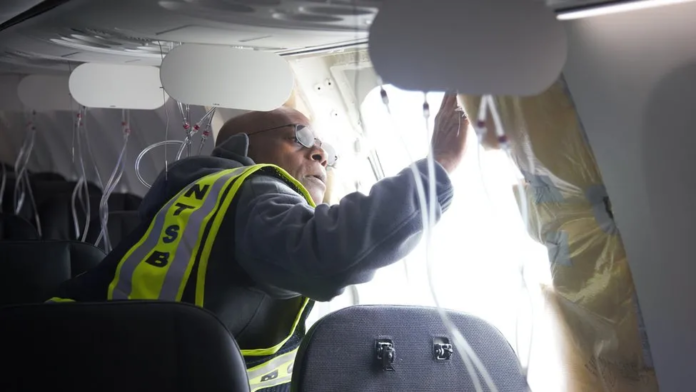A new report has revealed that a door that blew away from a Boeing 737 Max shortly after take-off may have not been properly secured. The US National Transportation Safety Board released initial findings from its probe into the incident on an Alaska Airlines plane in January, stating that four key bolts that were meant to lock the unused door to the fuselage appeared to be missing.
Boeing responded to the report by acknowledging its accountability for the incident. In a statement, Boeing’s president Dave Calhoun said, “An event like this must not happen on an airplane that leaves our factory. We simply must do better for our customers and their passengers.”
The incident occurred just minutes after Alaska Airlines Flight 1282 took off and resulted in a rapid loss of cabin pressure as a result of the door plug blowing out, leaving a gaping hole in the side of the aircraft fuselage. The missing bolts appeared to have allowed the door panel to move out of position and break away from the aircraft.
Boeing’s supplier, Spirit AeroSystems, manufactured the door plug, and it was installed in the fuselage before being delivered to Boeing. However, photographic evidence suggests that at least three of the four locking bolts were not put back in place when the plug was reinstalled.
The findings from the report are likely to make uncomfortable reading for Boeing, particularly as inspections have revealed loose bolts and fixings on other planes of the same specification, raising questions about the way they were built.
Boeing’s president and chief executive, Dave Calhoun, expressed that the improvement plan would involve significant action and transparency at every turn. He also stated that the company would implement new inspections of door plug assembly and fully document when the plug is removed, along with additional inspections into the supply chain and an independent assessment.
Prior to the Alaska Airlines incident, the 737 Max production line had faced other serious problems, including manufacturing defects and the scrutiny intensified due to the history of the 737 Max itself, which was involved in two major accidents in late 2018 and early 2019, resulting in the deaths of 346 people.
In response to the report, the head of the Federal Aviation Administration (FAA), Mike Whitaker, stated that the quality system issues at Boeing were unacceptable and promised to put more “boots on the ground” in Boeing’s factories for further scrutiny.
Boeing has reiterated its commitment to co-operate with investigators and regulators to ensure that all required procedures are put in place to prevent such incidents from happening again. The company continues to face intense scrutiny due to a history of problems in the production of the 737 Max.

